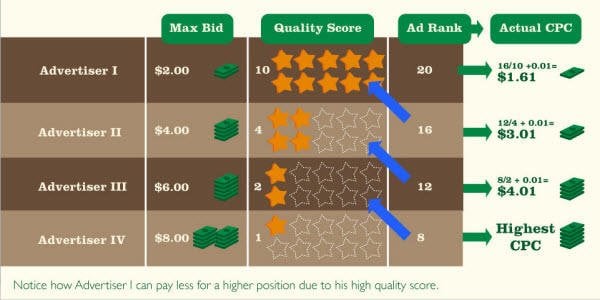CPC: What Is Cost Per Click?
CPC is short for cost per click, or the price you pay for each click in your pay-per-click (PPC) marketing campaigns. In this quick CPC tutorial, you’ll learn the answer to questions such as:
- What is CPC?
- Why is CPC important to you and to your PPC campaigns?
- How can you lower your CPC while maintaining traffic and conversions?
What Is CPC?
Cost per click, or CPC, is the amount you pay for each click on one of your PPC ads in platforms such as Google Ads or Microsoft Ads.
Your cost per click is determined by several factors, including your maximum bid, your Quality Score, and the ad rank of other advertisers bidding for the same keyword, as illustrated below:

Your CPC is an important metric because those clicks, and costs, add up fast. If your CPC is too high, you won’t be able to achieve return on your advertising investment (ROI).
What’s a Good CPC in Google Ads?
Your Google Ads ROI is determined by how much you are paying for clicks and the quality of the traffic you get from those clicks. You don’t just want traffic at any price; you want affordable traffic that drives meaningful value for your business.
Average cost per click varies depending on your industry, your business type, and what networks you’re advertising on. More competitive industries and industries with higher-priced conversions (such as enterprise software, industrial equipment, or expensive services in the law and financial industries) tend to have more expensive costs per click.
Check out the graph below to see CPC benchmarks across 20 common industries on both the search and display networks:

Lower Your CPC While Maintaining Value
Google Ads advertisers want to control their CPC while improving the quality of visitor traffic, so the money they spend on ad clicks is worthwhile. Check out our tips for lowering CPC here.
Your average CPC can be significantly lowered by improving your Quality Score. Your Quality Score is affected by your:
- Click-Through Rate – Click-through rate (CTR) is a measure of how often your ad is clicked on when it appears in the search results. Compelling PPC ads that are relevant to a user’s search query are much more likely to be clicked.
- Keyword Relevance – Ads that are clearly relevant to the keywords you’re bidding on, and that include the keywords in the ad text, tend to get higher CTR’s and Quality Scores.
- Ad & Landing Page Quality – It’s in Google’s interest to reward advertisers who create compelling, creative ads that resonate with users. Your landing pages (where users wind up after they click) should also be highly relevant to your keywords and ads, so users get what they’re looking for and can easily complete the desired action
Learn more about CPC and 28 other key PPC metrics here!
Improve Your CPC
To see how your CPC compares to similar advertisers, and how you can lower your CPC, use the Google Ads Performance Grader to get a fast, free analysis of your Google Ads account, with tips and insights into your costs, ad performance, mobile optimization and more.
